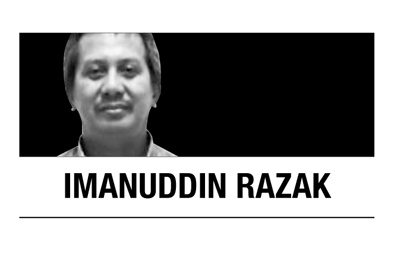
It was indeed a big leap forward when the defense ministers of Indonesia, Malaysia and the Philippines reached an agreement on Aug. 2 to conduct coordinated patrols to combat piracy in their waters.
The deal, which was made during the third trilateral defense ministers meeting in Bali, also includes a commitment by the three ASEAN neighbors to contain the spread of the Islamic State group’s movement in the region.
The agreement is expected to immediately address the problem of abduction — mainly involving Indonesian and Malaysian nationals employed on vessels passing through the dangerously unguarded sea lanes — and increasing security threats posed by people claiming to be IS militants, or their networks.
Dozens of Malaysian and Indonesian nationals have been abducted by the Philippines-based Abu Sayyaf terrorist group. The three countries, meanwhile, are potential breeding grounds for the dissemination of radical thoughts and subsequent threats of terrorist attacks, including by Abu Sayyaf, which has declared its allegiance to IS.
The growing threat of IS in the region stole the limelight in discussions during the three countries’ Third Ministerial Defense Meeting in Bali last Tuesday, during which they agreed to expand maritime cooperation to not only prevent the Abu Sayyaf group from kidnapping sailors in the Sulu Sea, but also to tackle attempts to smuggle weapons for IS supporters in the region.
As part of the agreement, the three countries established three command posts — in Bongao, the Philippines; Tawau, Malaysia; and Tarakan, Indonesia — where the three defense ministers can meet and discuss solutions to problems related to abductions and terrorism.
The two major aims of the coordinated forces are essentially two different sets of responsibilities that the militaries of the three countries have to perform. Each needs a different security or military approach. The question is whether these two ambitious amalgamated tasks can ultimately be performed given their broad differences.
In reference to their first task, the three countries have apparently made clear the coordinated forces’ terms of reference. As stipulated in the pact, military personnel from the three countries will be allowed to enter each other’s waters to pursue kidnappers or terrorist groups, such as Abu Sayyaf, during a state of emergency, but under certain limitations outlined in a signed standard operational procedures document agreed upon during the Bali meeting. The patrol was inspired by best practices shared by Indonesia, Malaysia, Singapore and Thailand in the Malacca Straits Patrol.
The maritime pact, however, did not choose a joint patrol scheme because the regular presence of military personnel in a country’s waters could be seen as a threat and could be used as jurisprudence for other countries to push the three to open access to their seas in the future.
Under the coordinated patrol system, Indonesia, Malaysia and the Philippines will guard their respective waters and will inform one another through a special communication line if a kidnapping takes place, to ensure swift action.
However, due to shared fears about Abu Sayyaf’s repeated moves in Sulu waters, the three countries customized the agreed coordinated patrol system under the standard operational procedures by allowing military personnel to enter one another’s waters in a state of emergency, but with the prior knowledge of the encroached upon party.
The three countries have also established safe routes for boats, guarded by military personnel, to prevent piracy and kidnapping. The agreement legalizes the use of sea marshals on board ships passing their borders.
They also have a shared understanding of the importance of allowing one another’s military personnel to hunt down kidnappers and terrorist groups, but no official agreement has been reached on the issue yet because the Philippines still has objections to the proposal due to constitutional hindrances.
In regard to the coordinated forces’ second task of containing the spread of IS, the three countries have yet to formulate their terms of reference, as such a task would need the involvement of more institutions from each of the three countries.
In Indonesia’s case, for example, the coordinated forces will need to involve personnel from the immigration directorate general, which controls data on the movement of people, particularly Indonesians on watch lists, and those from the National Police, which is responsible for the country’s counterterrorism and simultaneously keeps and updates data on terrorism.
In the Philippines, counterterrorism can be handled by all law enforcement agencies and the military. At the same time, there are also offices formed to handle, and prevent, threats of terrorism. Meanwhile in Malaysia, counterterrorism activities are performed by all levels of security services, including the military, police, border and infrastructure security, as well as civil defense.
As each of the three countries adopts different mechanisms in countering terrorism, it is therefore advisable that measures are discussed and agreed upon, particularly those that will ensure interoperability among agencies and organizations involved in counterterrorism — not only within a single country, but also among institutions in the three countries.
Besides all the technicalities, the coordinated forces should consider the financial state of each country. As for Indonesia, a newly announced budget cut will affect spending on security and defense, including for the operation of the coordinated forces. Similarly, the ongoing global economic slowdown may impact Malaysia and the Philippines.
As a result, security arrangements will very likely be affected and should be adjusted in line with the respective countries’ technical and financial capacities.
However, the challenges should not keep the countries from transforming their commitment into actions.
By Imanuddin Razak
Imanuddin Razak is a journalist at the Jakarta Post, which is published in Indonesia. — Ed.
(The Jakarta Post/Asia News Network)








![[Weekender] Korea's traditional sauce culture gains global recognition](http://res.heraldm.com/phpwas/restmb_idxmake.php?idx=644&simg=/content/image/2024/11/21/20241121050153_0.jpg)